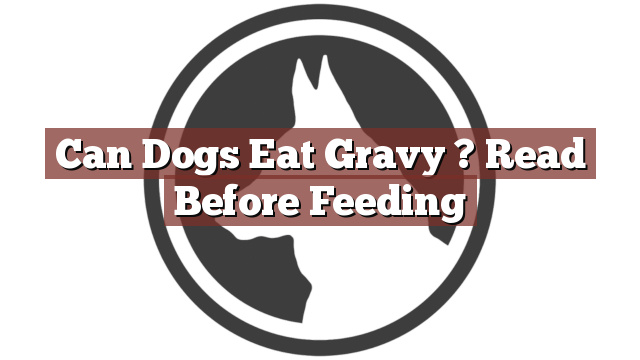Understanding Your Dog’s Dietary Needs
As pet owners, it is crucial for us to understand the dietary needs of our furry friends. Dogs have specific nutritional requirements that differ from humans. While dogs are primarily carnivorous, their diet can also include some fruits and vegetables in moderation. However, not all human food is suitable for our canine companions. It is important to be cautious about what we feed them to ensure their health and well-being.
Can Dogs Eat Gravy? Read Before Feeding
Can dogs eat gravy? This is a common question that many dog owners might have. The answer is yes, but with caution. Gravy is typically made from meat drippings, broth, flour, and various seasonings. While it may seem harmless to share a little bit of gravy with our dogs, there are some factors to consider before doing so.
Gravy can be high in sodium, which is not suitable for dogs in large amounts. Additionally, some gravies may contain ingredients like onions or garlic, which can be toxic to dogs. Moreover, the thick consistency of gravy can make it difficult for dogs to digest properly. Therefore, it is crucial to be mindful of the ingredients and the serving size when considering feeding your dog gravy.
Pros and Cons of Feeding Gravy to Dogs
Feeding gravy to your dog can have both pros and cons. On the positive side, gravy can enhance the taste of their regular dog food, making it more appealing to picky eaters. It can also provide extra moisture, which is especially beneficial for dogs who may not drink enough water. Additionally, if the gravy is homemade, you have more control over the ingredients, making it a healthier option.
However, there are also potential downsides to feeding gravy to dogs. As mentioned earlier, store-bought gravies may contain excessive sodium or harmful ingredients. Moreover, the high fat content in some gravies can lead to weight gain and digestive issues. If your dog has a sensitive stomach or any dietary restrictions, it is best to consult with your veterinarian before incorporating gravy into their diet.
Conclusion: Considerations for Feeding Gravy to Your Dog
In conclusion, while dogs can eat gravy, it is important to exercise caution and consider the potential drawbacks. The answer to "can dogs eat gravy?" is yes, but in moderation and with careful attention to its ingredients. If you decide to feed your dog gravy, opt for homemade varieties without any harmful ingredients. Always introduce new foods gradually and monitor your dog for any adverse reactions. Consulting with your veterinarian is always recommended to ensure that you are providing a balanced and appropriate diet for your canine companion. Remember, their well-being should always be the top priority.
Thank you for taking the time to read through our exploration of [page_title]. As every dog lover knows, our furry friends have unique dietary needs and responses, often varying from one canine to another. This is why it's paramount to approach any changes in their diet with caution and knowledge.
Before introducing any new treats or making alterations to your dog's diet based on our insights, it's crucial to consult with a veterinarian about [page_title]. Their expertise ensures that the choices you make are well-suited to your particular pet's health and well-being.
Even seemingly harmless foods can sometimes lead to allergic reactions or digestive issues, which is why monitoring your dog after introducing any new food item is essential.
The content provided here on [page_title] is crafted with care, thorough research, and a genuine love for dogs. Nevertheless, it serves as a general guideline and should not be considered a substitute for professional veterinary advice.
Always prioritize the expert insights of your veterinarian, and remember that the health and happiness of your furry companion come first.
May your journey with your pet continue to be filled with joy, love, and safe culinary adventures. Happy reading, and even happier snacking for your canine friend!

